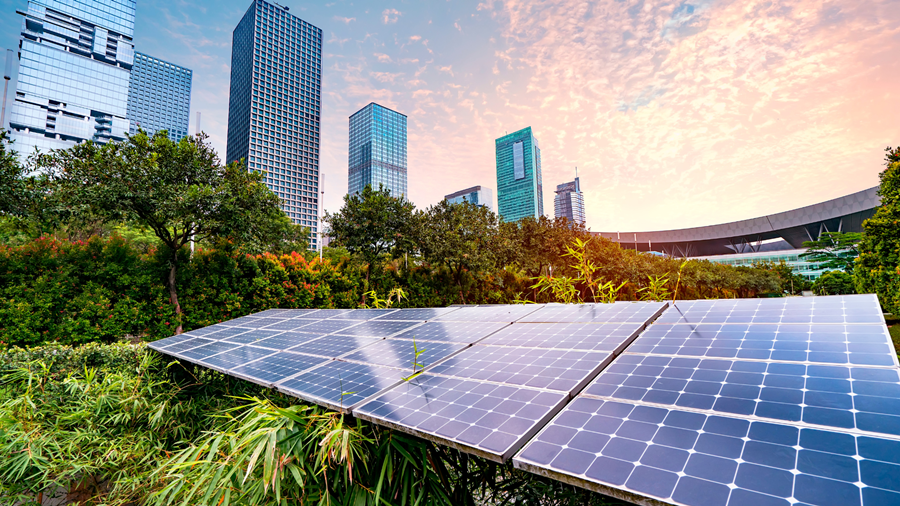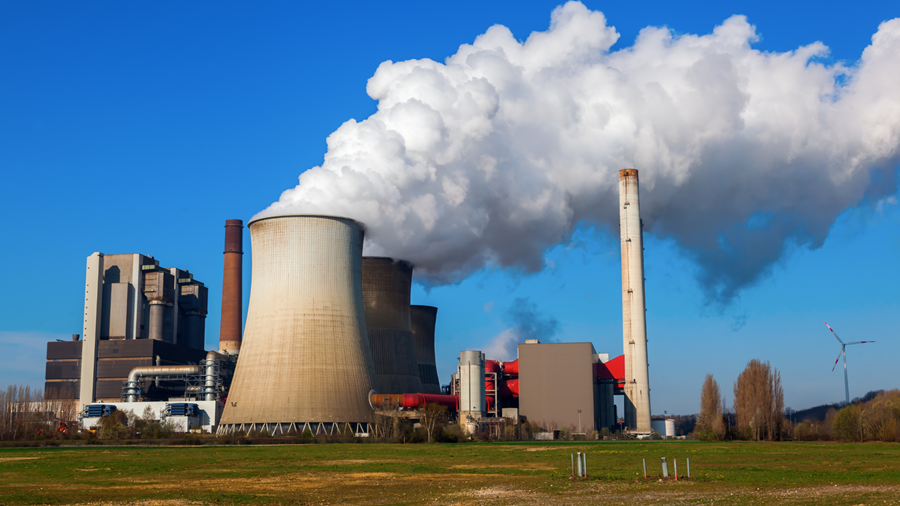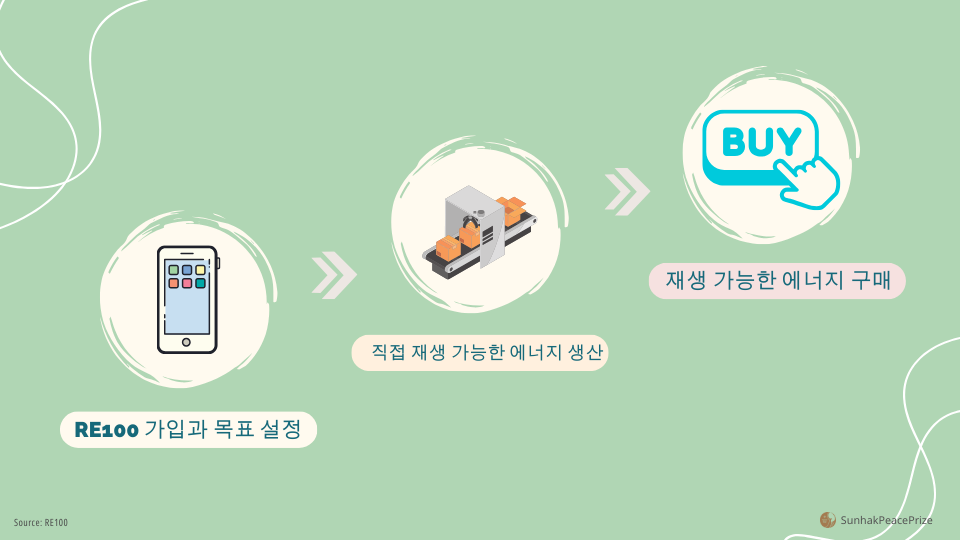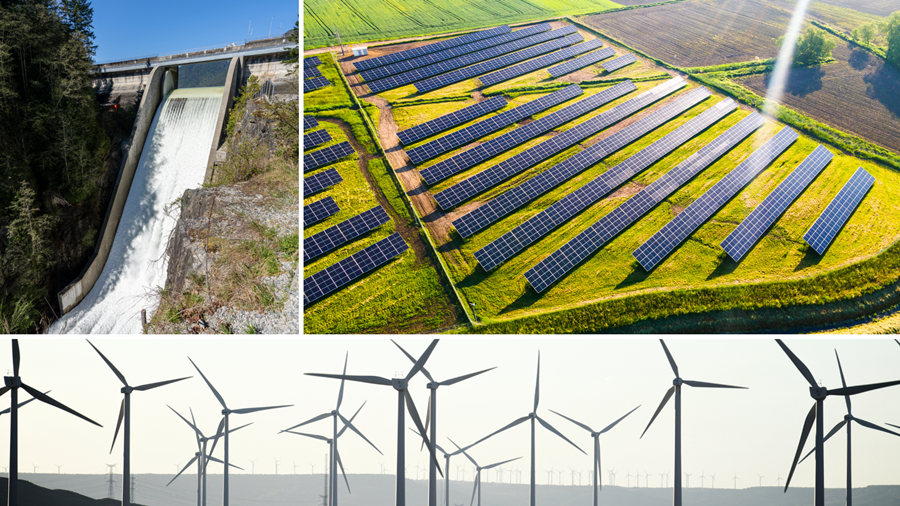RE100 is a campaign encouraging corporations worldwide to transition their power usage to 100% renewable energy.
―
Q. What is RE100?
―

A. RE100 stands for 'Renewable Energy 100%', a campaign urging global corporations to switch their power consumption entirely to renewable energy sources. In other words, it’s a commitment by companies to exclusively use electricity generated from eco-friendly sources like solar and wind power.
This campaign wasn’t initiated by any specific government but started at a private level. It was spearheaded in 2014 by the multinational non-profit organization 'The Climate Group' in collaboration with the CDP (formerly known as the Carbon Disclosure Project).
When a particular company commits to RE100, its suppliers and subcontractors, who deliver components or represent the company’s manufacturing, also need to use renewable energy. This ripple effect allows the influence of RE100 to spread beyond national borders.
Apple is a prominent example. Joining RE100 in 2016, Apple set a goal to use 100% renewable electricity. Since then, 110 of Apple's suppliers have committed to using 100% renewable electric energy.
―
Q. Why is RE100 important?
―

A. Halting climate change urgently requires reducing fossil fuel usage and transitioning to renewable energy, and RE100 is a vital campaign leading this change.
In 2023, Earth's average temperature reached record levels, making it one of the hottest years on record. This year's average global temperature was 1.46 degrees Celsius higher than the pre-industrial era average (1850-1900), surpassing the previous record set in 2016 by 0.13 degrees Celsius.
If about 25% of the world's electricity were to transition to renewable energy, it could reduce annual greenhouse gas emissions by approximately 10 billion tons. This impact is equivalent to removing about 200 million cars from the roads.
Therefore, RE100 represents a powerful initiative capable of driving significant environmental change.
Check out this article to learn more about a Just Transition ↓↓↓ |
―
Q. How does RE100 work?
―
A. When companies join RE100, they must set goals to increase their use of renewable energy. To achieve these goals, they either produce renewable energy directly or purchase it.
Not quite clear? Let's explain how RE100 works by comparing it to the process of buying our cherished item, the 'smartphone'.
1st Step: Joining RE100 and Setting Goals
This is similar to you deciding to buy a smartphone and choosing which model to purchase. When a company joins RE100, it sets a goal to source its electricity from renewable energy.
2nd Step: Direct Production of Renewable Energy
Some companies can produce renewable energy themselves. This is like you making your own smartphone. Though not impossible, it's quite challenging. For example, a company could install solar panels to produce electricity, but it's not an easy task.
3rd Step: Purchasing Renewable Energy from Other Companies
Most companies do not produce renewable energy themselves; instead, they purchase it from other companies that provide it. This is similar to you not making your own smartphone but buying it from a store or online shop.

Check out this article to learn more about Circular Economy! ↓↓↓ |
―
Q. What is the impact of RE100?
―
A. The efficacy of RE100 is remarkably high. If the over 400 companies that have joined RE100 were considered as a single nation, they would rank as the 10th largest electricity consumer in the world.
It's truly impressive to think of a 'country' equivalent to the world's 10th highest electricity consumer operating solely on renewable energy! The RE100 members now consume more electricity annually than France and are approaching the consumption levels of Germany.
The RE100 initiative has committed to using over 500 Terawatt-hours (TWh) of electricity annually as 100% renewable power by 2050. To put this in perspective, 500 TWh is enough to charge approximately 130 million smartphones once a day, every day for a year.
1. Acceleration of Energy Transition
As of 2020, companies participating in RE100 used approximately 300 terawatt-hours (TWh) of clean electricity globally. This amount of energy is equivalent to charging about 80 million smartphones continuously for a year.
2. Growth of the Renewable Energy Market
As large corporations involved in RE100 transition to renewable energy, the renewable energy market is expected to grow up to 98 gigawatts (GW) by 2030.
―
Q. Which companies have joined RE100?
―

A. Numerous well-known companies like Google, Apple, Microsoft, Adobe, 3M, SK Hynix, Airbnb, Burberry, and Chanel have joined RE100. As of January 1, 2024, a total of 426 major corporations worldwide have committed to consuming 100% renewable power by 2050.
To check the companies that have joined RE100, click the link! ↓↓↓ |
The companies participating in the RE100 campaign each have unique approaches to achieving 100% renewable energy usage.
◎ Google: Google joined RE100 in 2015. They have set an intermediate goal to triple their renewable energy purchases by 2025 and a long-term goal to switch all corporate operations to renewable energy by 2050. Google is already the world's largest purchaser of renewable energy and uses its influential position to explore innovative technologies and supply green power produced locally to its offices and data centers.
◎ Microsoft: Microsoft joined RE100 in 2015. They have been operating on 100% renewable energy since 2014, investing in renewable energy credits and renewable power generation projects at their data centers, including wind turbines and solar panels.
◎ Burberry: Burberry joined RE100 in 2017. Currently, Burberry obtains 58% of its total energy (68% of its electricity) from renewable sources. They are actively utilizing sustainable materials and practices, including introducing regenerative farming practices in collaboration with Australian wool farmers.
―
Q. What are the technical standards of RE100?
―
A. The crux of the RE100 campaign lies in the criteria defining 'what constitutes renewable energy'. To ascertain if companies are genuinely using 'renewable' energy, several standards are applied: ▲renewable energy sources, ▲age limits for power plants, ▲Energy Attribute Certificates (EACs), and ▲changes in market boundaries.
Imagine participating in a 'recycled toilet paper usage' campaign. To truly experience the campaign's effects, you must use genuinely 'recycled' toilet paper that meets specific standards.
Similarly, companies participating in RE100 must prove they are purchasing and using 'genuine' renewable energy. The technical standards of RE100 to certify this are as follows:
1. Renewable Energy Sources: Companies must purchase electricity from renewable sources such as wind, solar, hydropower, geothermal, or biomass. In particular, biomass and hydropower must be sustainable and verified through third-party certification.
2. Age Limit for Power Plants: As of January 1, 2024, the electricity purchased must come from power plants established or reconstructed within the last 15 years. This is because newer facilities are generally more efficient and less harmful to the environment.
3. Energy Attribute Certificates (EACs): When a company purchases renewable power, the amount of electricity consumed and the amount purchased (as indicated on the Energy Attribute Certificates) must match. These certificates validate the actual use of the specified quantity of renewable electricity.
4. Changing Market Boundaries: Electricity consumed in certain European countries must be sourced from within those countries. This standard encourages companies to use renewable energy produced in their local area or specific regional markets.
RE100 encourages its members to adhere to these standards, thereby increasing the use of renewable energy and contributing to the reduction of global carbon emissions.
Checking the Technical Criteria of RE100 ↓↓↓ |
Check out this article to learn more about Nature based Solutions! ↓↓↓ |
―
Joining Climate Action with RE100!
―

To create a sustainable world for everyone, it's imperative to reduce the use of fossil fuels.
Now that we understand RE100 better, what can we do? We can accelerate corporate eco-friendly initiatives by purchasing products from companies participating in RE100. After all, consumers are the ones who drive companies.
Additionally, we can raise awareness about the RE100 initiative through social media, discussing the importance of renewable energy and heightening consciousness about climate change in the online ecosystem.
These small actions contribute to the transition to renewable energy and the fight against climate change.
Why not start by checking if the product next to you is produced by a company that's part of RE100?
“To embrace the future,
we must expand the scope of vocations that can herald the coming of peace.
Even though we may never meet our descendants, we must make sure that all their activities will harmonize in peaceful societies and nations.”
-Dr. Hak Ja Han Moon
Founder of Sunhak Peace Prize-
Learn More: |
Written by Sharon Choi
Director of Planning
Sunhak Peace Prize Secretariat

